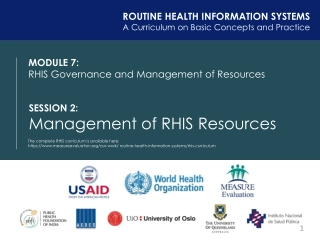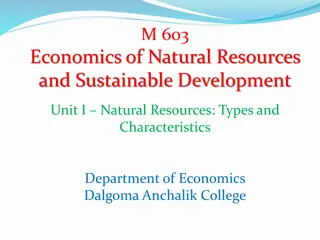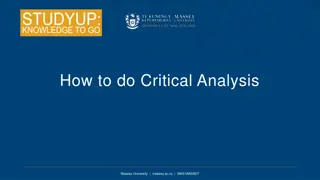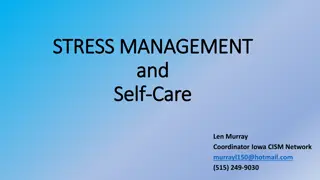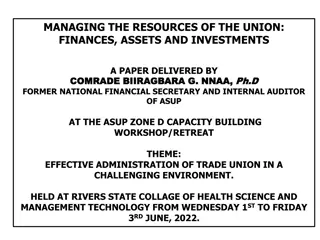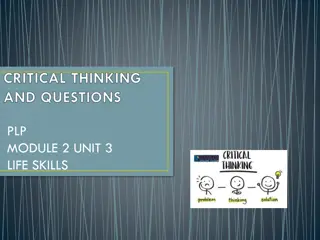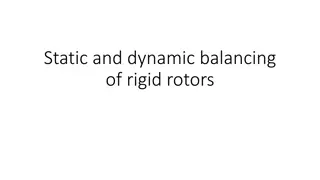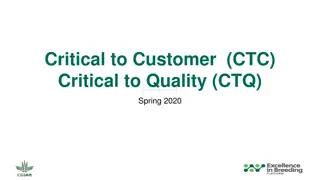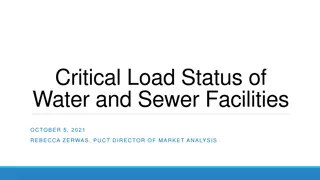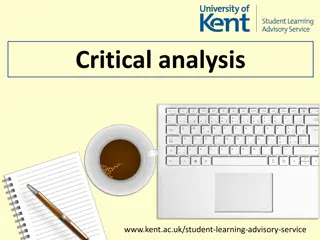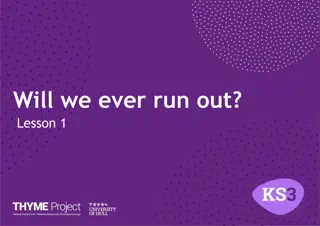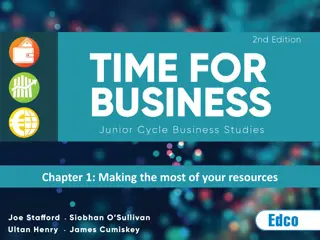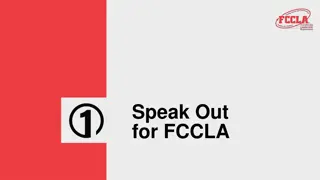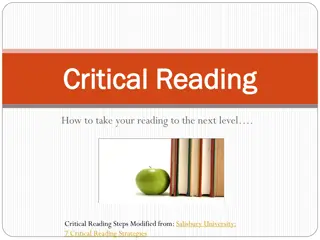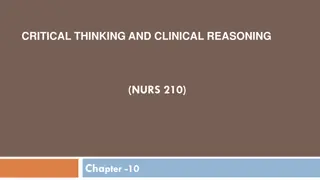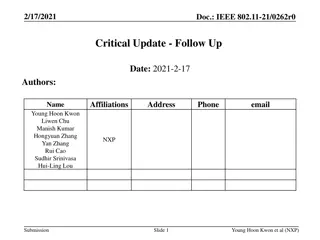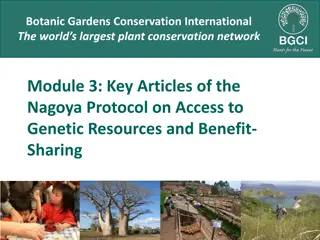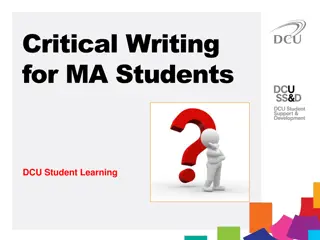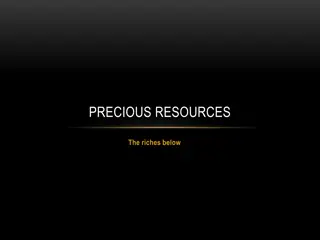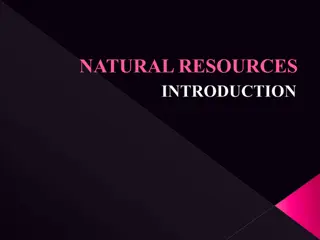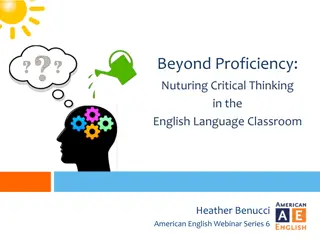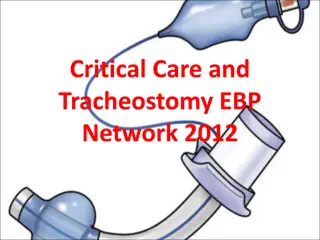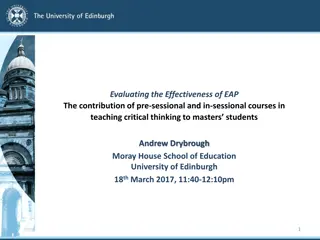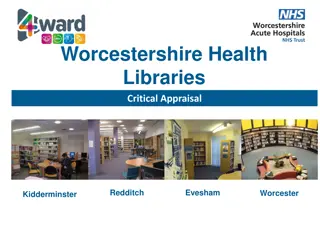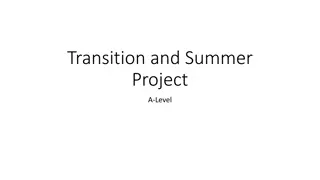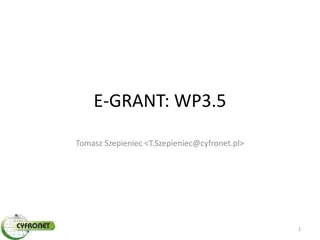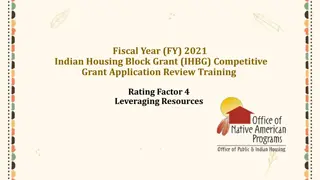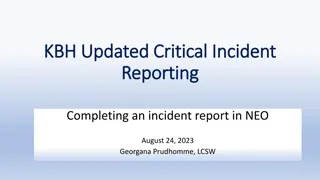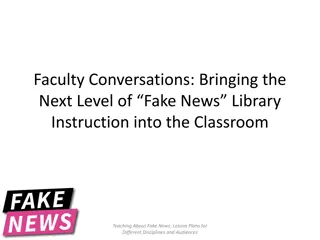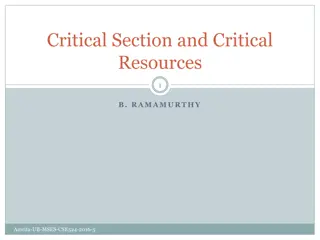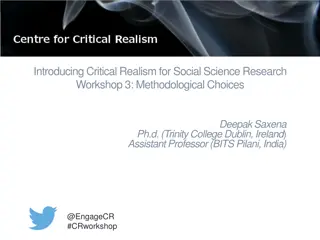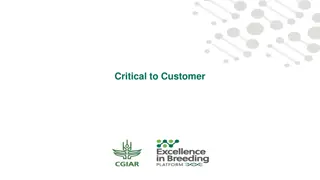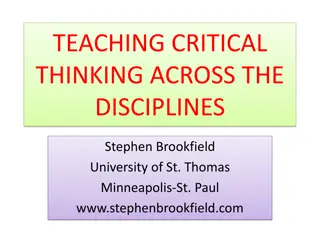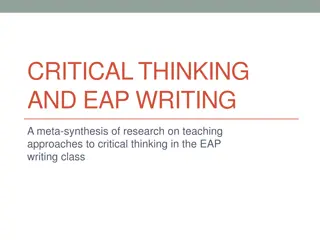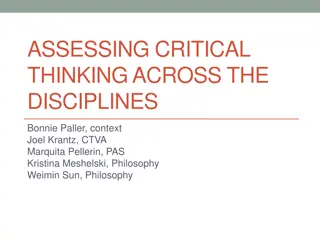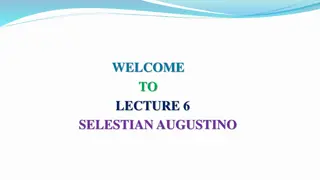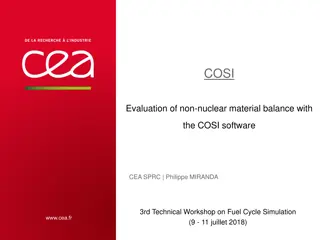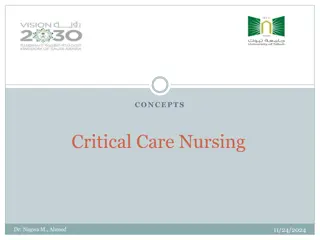Managing RHIS Resources: Governance and Mobilization
Governance and management of resources in routine health information systems (RHIS), covering topics such as human resources, financial resources, and physical resources. Participants will learn about workforce needs, training infrastructure, budgeting, procurement, and maintenance. The module also
1 views • 15 slides
Understanding Critical and Non-Critical Incidents in Incident Reporting
Critical incidents, as defined by regulations, are serious events that pose immediate risk to health, safety, or welfare. Non-critical incidents, on the other hand, are minor in nature and do not have serious consequences. Incident reports play a crucial role in documenting occurrences, identifying
0 views • 29 slides
Understanding Natural Resources and Resource Economics
Economics of natural resources focuses on the supply, demand, and sustainable allocation of the Earth's resources. It aims to develop a sustainable economy that protects natural resources for future generations. Natural resources are essential for human survival and include biotic and abiotic resour
0 views • 11 slides
How to do Critical Analysis
Massey University provides valuable insights on critical analysis, distinguishing between description and analysis, evaluating evidence and reasons, and making strong arguments. Critical thinking involves evaluating evidence to reach informed conclusions, surpassing mere understanding. While descrip
0 views • 22 slides
Understanding Critical Incident Stress Management (CISM)
Critical Incident Stress Management (CISM) is crucial for addressing the emotional, physical, and psychological reactions to overwhelming events. This includes definitions of critical incidents, CISM teams, peer support, and crisis response teams. Learn how the International Critical Incident Stress
2 views • 25 slides
Managing the Resources of the Union: Finances, Assets, and Investments
Effective management of resources such as finances, assets, and investments is essential for the success of any organization, including trade unions like the Academic Staff Union of Polytechnics (ASUP). This paper, delivered by Comrade Biiragbara G. Nnaa, explores the importance of managing union re
1 views • 12 slides
Enhancing Critical Thinking Skills Through KWHL Chart
Critical thinking entails questioning and seeking more information before accepting ideas. The KWHL chart method is introduced to improve critical thinking skills, encouraging students to note what they know, what they want to learn, how they can learn more, and what they have learned. Engaging in a
0 views • 5 slides
Understanding Rigid Rotor Balancing and Critical Speed
Explore the concepts of static and dynamic balancing of rigid rotors, determining when a rotor can be assumed rigid based on speed, examining Jeffcott rotor critical speed problems, and discussing the simplest model of rotor systems. Learn about rotor imbalance, free vibrations, natural frequency, a
1 views • 29 slides
Understanding Critical to Customer (CTC) and Critical to Quality (CTQ)
Quality is determined by meeting customer needs. Critical to Customer (CTC) Flowdown translates these needs into Critical to Quality (CTQ) aspects. This tool helps organizations identify what is critical to meet customer expectations, serving as a communication tool and guiding improvement projects.
2 views • 10 slides
Critical Load Status of Water and Sewer Facilities - Filing Requirements and Impacts
Water and wastewater utilities in Texas are required to provide critical load status information to various entities by November 1, 2021. The Senate Bill 3 of the 87th Legislature outlines the filing requirements and impacts on electric utilities and Retail Electric Providers (REPs). The process inv
2 views • 4 slides
Critical Thinking in Islamic Methodology
Explore the concept of critical thinking in Islam, identifying key skills and understanding the importance of constructive criticism. Delve into the methodology of thinking in Islam that transcends superficial understanding, enabling individuals to distinguish between good and bad, correct and incor
2 views • 12 slides
Mastering Critical Analysis in Higher Education
Developing a critical approach is crucial for higher education students to enhance knowledge, problem-solving skills, and idea development. This skill involves analyzing sources, evaluating credibility, and identifying key elements. Explore the differences between descriptive and critical analysis,
1 views • 11 slides
Understanding Earth's Resources: The Challenge of Limited Availability
Explore the concept of limited natural resources, the classification of resources into living and non-living categories, the sustainable economic model of the Bioeconomy, and the implications of a Circular Economy. Learn how Earth's resources are created through processes like photosynthesis and the
0 views • 16 slides
Making the Most of Your Resources
Learn about different types of resources such as natural, financial, human, physical/capital, and time resources. Understand how to match your resources to your needs and wants, appreciate the impact of resource usage on others, and differentiate between financial cost and opportunity cost. Explore
0 views • 18 slides
Exploring Critical Thinking in a Digital Society
Delve into the realm of critical thinking in the modern era, where information is readily available. Discover how easy access to data impacts our ability to think critically. Explore the importance of critical thinking and its application in today's society. Learn about the six-step critical thinkin
0 views • 32 slides
Unlocking Critical Reading Skills: Strategies and Techniques
Enhance your reading comprehension through critical reading practices. Understand the definition of critical reading, its importance in the reading process, and learn practical steps to become a critical reader. Discover how critical reading fits into the C.A.R.E. model and the benefits it brings to
0 views • 26 slides
Enhancing Critical Thinking and Clinical Reasoning in Nursing Practice
Nursing students will gain insights into critical thinking techniques and the integration of clinical reasoning in problem-solving. The importance of critical thinking for identifying client issues, implementing effective interventions, and promoting care outcomes is emphasized. Techniques like crit
0 views • 36 slides
IEEE 802.11-21/0262r0 Critical Updates Discussion Summary
The document discusses critical updates related to IEEE 802.11-21/0262r0, focusing on changes in system information for APs within an AP MLD. It addresses scenarios where non-AP STAs receive Beacon frames with direct inclusion events, potential issues with updating critical information, and proposes
0 views • 9 slides
Understanding the Key Articles of the Nagoya Protocol on Access to Genetic Resources and Benefit-Sharing
The Nagoya Protocol aims to promote fair sharing of benefits from genetic resources utilization for conservation efforts. It encompasses access, technology transfer, funding, and respect for rights over resources and technologies. The protocol applies to genetic resources, traditional knowledge, and
1 views • 19 slides
Mastering Critical Writing for MA Students: A Guide to Enhancing Academic Skills
Enhance your critical writing skills with this comprehensive guide tailored for MA students. Explore critical thinking, understanding arguments, critical reading, and effective writing techniques. Develop original ideas, create valid arguments, and engage in analysis to boost your academic performan
0 views • 20 slides
Unveiling Earth's Riches: Resources, Minerals, and Sustainability
Australia is known for its abundant natural resources, including coal, gas, minerals, and metals. However, the country faces challenges with water scarcity. The Earth's crust holds valuable resources essential for everyday items and fuels. Understanding the importance of using resources wisely for a
0 views • 16 slides
Understanding Natural Resources: Types and Conservation
Natural resources play a crucial role in sustaining life on Earth, encompassing elements like water, air, soil, minerals, and more. These resources can be classified into renewable and non-renewable categories, with the former being replenishable through natural cycles and the latter being finite an
0 views • 24 slides
Enhancing Critical Thinking Skills in the English Language Classroom
Explore the importance of nurturing critical thinking skills in the EFL classroom through understanding the essence of critical thinking, discussing its definitions, and embracing practical ideas for implementation. Delve into the process of critical thinking, integrating Bloom's Taxonomy to foster
0 views • 50 slides
Evidence-Based Practice in Critical Care: Focus on FEES in Dysphagia Management
This presentation outlines the activities of the Critical Care and Tracheostomy EBP Network in 2012, including a review of the year, changes in leadership, and discussions on the use of Fiberoptic Endoscopic Evaluation of Swallowing (FEES) in critical care settings. Various research articles are dis
0 views • 16 slides
Effectiveness of EAP in Teaching Critical Thinking to Masters Students
This presentation by Andrew Drybrough evaluates the contribution of pre-sessional and in-sessional courses in teaching critical thinking to masters students. It discusses the importance of critical thinking skills in EAP, examines the responsibilities of various stakeholders, addresses the audience
0 views • 27 slides
Understanding Evidence-Based Medicine and Critical Appraisal in Healthcare
Dive into the world of Evidence-Based Medicine (EBM) and Critical Appraisal to enhance clinical care. Explore resources, learn to evaluate research, and apply the CASP framework for better patient outcomes. Discover why critical appraisal is essential and how to navigate the hierarchy of evidence in
0 views • 28 slides
Exploring 3D Design and Critical Analysis in Architecture
Dive into the world of 3D design and critical analysis with a focus on architecture. Discover the stages of design, essential skills for designers, and areas of study in three-dimensional design. Delve into iconic buildings like Frank Lloyd Wright's Falling Water, analyze their key features, and eve
0 views • 9 slides
E-GRANT: Resource Allocation Tool Features and Development
E-GRANT is an advanced resource allocation tool developed by EGI-Engage for efficiently managing resources allocation for projects related to computing, storage, and VMs. The tool allows customers to send requests, negotiate resources, sign SLAs, and view allocations. It also enables resources provi
0 views • 5 slides
Leveraging Resources in FY 2021 IHBG Competitive Grant Application
The FY 2021 IHBG Competitive Grant Application emphasizes Leveraging Resources as Rating Factor 4, where applicants can earn up to 5 points based on the percentage of leveraged resources relative to project costs. Firm commitments through cash or in-kind donations are encouraged, with examples inclu
0 views • 31 slides
Understanding Critical Incident Reporting in Behavioral Health Services
Behavioral health services providers like KBH are required to report and track critical incidents and sentinel events in order to ensure client safety and program integrity. This involves identifying trends, reporting abuse, and following specific reporting processes set by accrediting bodies. The N
0 views • 29 slides
Enhancing Critical Thinking Through Fake News Instruction
Explore strategies to teach critical-thinking skills in the context of fake news across various academic disciplines. Learn how to prioritize and analyze critical-thinking skills essential for evaluating news items and develop tailored library instruction to enhance students' information literacy. A
0 views • 7 slides
Managing Critical Resources in Concurrent Processes
Concurrent processes can enhance performance but require careful handling of critical resources to prevent inconsistency. Utilizing semaphores for mutual exclusion and synchronization can help control access to shared resources. This article discusses the principles of concurrency, issues with inter
0 views • 18 slides
Exploring Critical Realism for Social Science Research: Methodological Perspectives
Delve into the methodological choices and key concepts of Critical Realism for social science research, including the nature of reality, researcher-inquirer relationships, and assumptions about human agency. Learn about the domains of reality in Critical Realism and the distinction between qualitati
0 views • 10 slides
Understanding Critical Customer Needs for Project Success
Explore the concept of Critical to Customer (CTC) by identifying the essential features necessary to satisfy both internal and external customers. Learn how to apply techniques like CTC Flowdown and determine Critical to Quality (CTQ) factors. Discover how to develop a CTC tree to link project outpu
0 views • 9 slides
Enhancing Critical Thinking: Strategies and Practices Across Disciplines
Explore the multifaceted dimensions of critical thinking in teaching and learning across various disciplines. Uncover the importance of identifying assumptions, the role of different traditions in promoting critical thought, and practical techniques like the Circle of Voices. Discover how critical t
0 views • 16 slides
Enhancing Critical Thinking in EAP Writing: A Meta-Synthesis Study
Investigating the teaching approaches to critical thinking in EAP writing classes, this meta-synthesis research delves into the importance of critical thinking, key issues in the literature review, defining critical thinking, enhancing criticality in academic writing, and understanding critical thin
0 views • 14 slides
Enhancing Critical Thinking Skills Across Disciplines
Explore strategies for fostering critical thinking skills through various disciplines, including identifying levels of critical thinking, designing effective assignment prompts, and addressing real-world issues like sustainability and political participation. Understand the importance of prompting r
0 views • 31 slides
Understanding Critical Path Method in Project Management
Critical Path Method (CPM) is a vital tool in project management for determining the longest sequence of tasks essential to complete a project within a specified timeframe. This method helps project managers identify tasks critical to project completion and allows for efficient scheduling and resour
1 views • 60 slides
Evaluation of Critical Non-Nuclear Material Balance Using COSI Software
Emerging technologies have led to a demand for critical materials, defined based on supply risk and economic importance. The COSI software evaluates non-fissile material balance, focusing on materials labeled as critical for the EU economy. The concept of criticality considers factors like political
0 views • 13 slides
Understanding Critical Care Nursing: Principles, Definitions, and Types of Units
Critical care nursing involves providing specialized and individualized care to patients with life-threatening conditions. The concept, principles, definitions, and types of critical care units are discussed, emphasizing the importance of early detection, prompt action, and anticipating patient need
0 views • 20 slides
